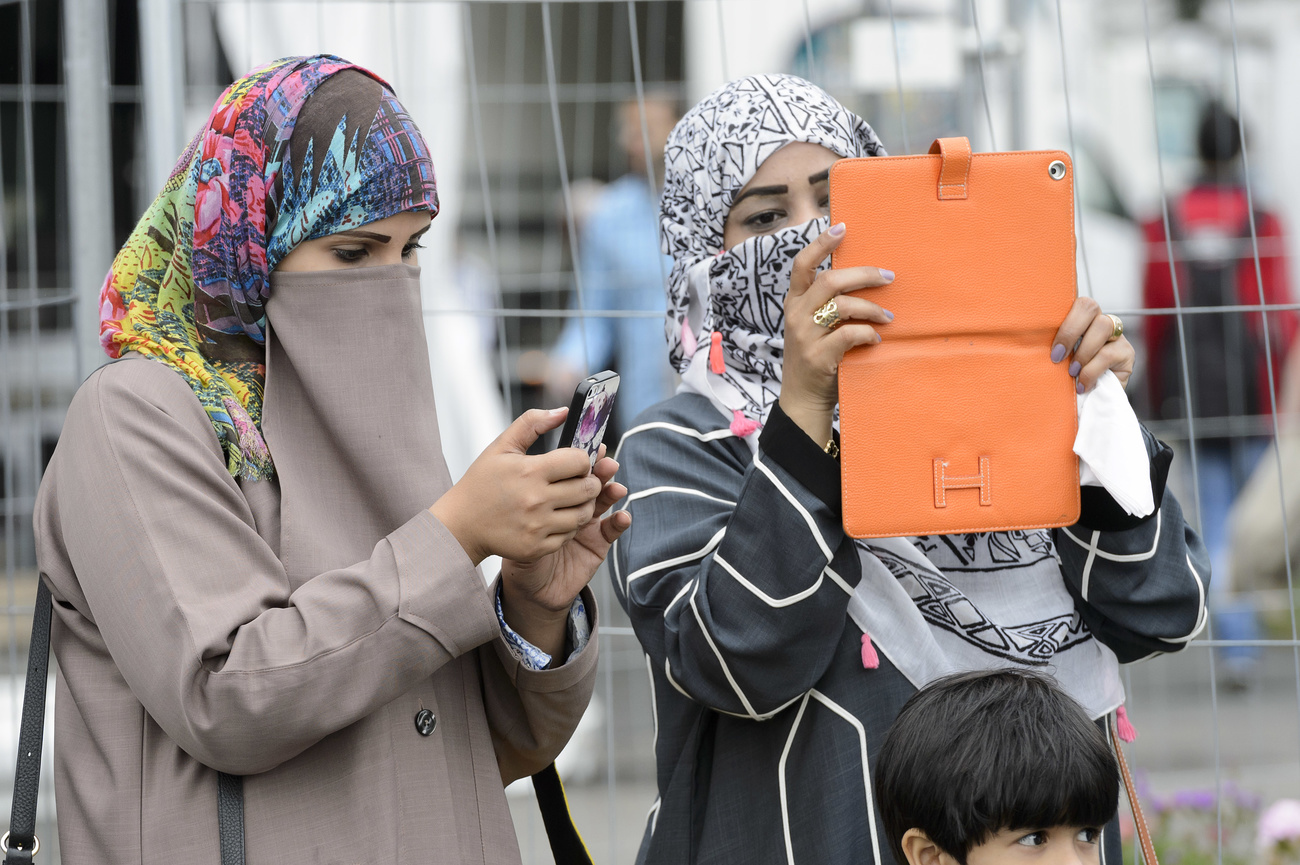
Proposed burka ban has solid support, poll finds

Supporters of a proposed face-cover ban in Switzerland have a clear lead over opponents ahead of a nationwide ballot to be held in March, according to a new opinion poll, published on Friday.
Attempts to challenge a government-licensed digital identification scheme (eID) and a controversial free trade accord with Indonesia – two other issues that come before Swiss voters in seven weeks – appear to fail.
The poll was commissioned by the Swiss Broadcasting Corporation (SBC), swissinfo.ch’s parent company, and carried out by the GfS Bern research institute.
For detailed figures see chart below.
Martina Mousson, political scientist and project leader at the leading research institute, says she is not surprised by the poll result.
“People’s initiatives usually start off well but as a rule they lose ground as the campaigns gather speed and opponents present their counter-arguments,” she said.
She does not explain why respondents among the expat Swiss community appear to be more strongly in favour of a ban.
The main argument by the proponents of the ban appear to be security concerns and to a lesser extent Islamophobic sentiments she analyses.
The initiative was launched five years ago and is generally considered as an attack by members of the right-wing Swiss People’s Party against followers of the Islamic religion, which requires women to wear the burka and niqab.
Mousson notes a clear polarisation between supporters from the political left and the political right. She said respondents in the French- and Italian-speaking cantons are backing the initiative more than those in the German-speaking cantons of Switzerland.
Asked about a possible impact of the coronavirus pandemic and the wearing of masks in public for hygiene, Mousson remains sceptical.
She said it could work either way and the situation was further complicated by the fact that women’s rights is used as an argument both by the political right as well as by feminists mainly from the political left.
The ballot on the proposed burka ban comes nearly 12 years after Swiss voters approved a ban on the construction of new minarets, in what was seen as a political upset.
Mousson says a direct comparison between the two initiatives is difficult.
“Possible anti-Islamic sentiment doesn’t seem to be a taboo topic today as much as in 2009. There are face-cover bans in place at a local level in Switzerland and in neighbouring countries,” she said.
But the issue certainly has potential for a lively campaign, Mousson added.
Palm oil and eID
A free trade accord with Indonesia, including controversial quotas for the import of palm oil to Switzerland, enjoys solid backing according to pollsters
But a considerable number of respondents, 13%, has yet to make up their minds about the issue. The poll revealed a split between respondents from the right and the centre versus the left as well as those without clear links to a party.
Supporters seem to have the stronger, mainly economic arguments, but Mousson points out that environmental issues have proven popular in previous votes and elections over the past two years.
“It will be interesting to see if opponents manage the turn things round,” she said.
Attempts to veto newly-adopted laws at the ballot box usually flop. Switzerland’s history of direct democracy shows the government has a clear advantage.
The same rule also applies, in theory, to the vote about a legal basis for an electronic authentication scheme which is meant to simplify the use of online services, both for commercial purposes as for e-government offers.
But 11% of respondents in the survey are still undecided, possibly struggling to understand the issue. Supporters of the eID law currently have a slim majority with a margin of just 5%.
Political scientist the research institute’s co-director, Lukas Golder, says the issue is a “matter of trust” in the authorities.
The survey found that younger citizens are more concerned about data protection and he doesn’t rule out a defeat for parliament and the government.
“It is possible that both the grassroots from the left and the right alongside voters with no close links to a political party could sway the result,” Golder said.
Pollsters interviewed 9,067 Swiss citizens from all language regions across the country and among the expatriate Swiss community for the first of two nationwide surveys.
The survey is based on online responses as well as telephone interviews, both with fixed line and mobile phone users, and was carried out from January 11-24.
The margin of error is 2.8%.
The poll was commissioned by the Swiss Broadcasting Corporation (SBC), SWI swissinfo.ch’s parent company, and carried out by the GfS Bern research institute.

In compliance with the JTI standards
More: SWI swissinfo.ch certified by the Journalism Trust Initiative


























You can find an overview of ongoing debates with our journalists here . Please join us!
If you want to start a conversation about a topic raised in this article or want to report factual errors, email us at english@swissinfo.ch.